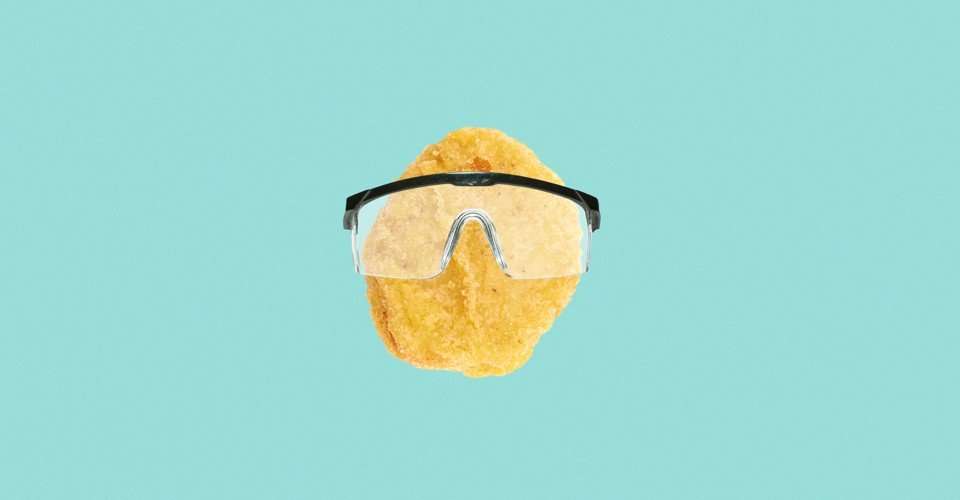Read: The farcical battle over what to call lab-grown meat
“Every big brewery has a little room in the back which is clean, and has people in white lab coats, and they’re not ‘lab-grown’ beer,” argues Michael Selden, the co-founder of a cell-based-fish start-up, Finless Foods. “But we’re for some reason lab-grown fish, even though it really is the exact same thing.”
Regardless of what you call it, Just and others say it’s coming. Just, which was called Hampton Creek until last year, started out making vegan “eggs” and mayonnaise, then revealed in 2017 that it had also been working on cultured meat. The nugget was served to me to demonstrate that Just isn’t vaporware, in Silicon Valley parlance, or in this case, vapor-poultry. There’s a there there, and it’s edible.
Just has been mired in turmoil in recent years, as board members resigned and former employees complained of shoddy science. (CEO Josh Tetrick calls the claims “blatantly wrong.”) Because of what the company said are regulatory hurdles, Just missed its goal of making a commercial sale of the chicken nuggets by the end of 2018. The Atlantic ran a somewhat unflattering profile of Tetrick in 2017, implying that the company is more style than substance.
Tetrick seemed eager to prove this magazine wrong. He told me he tries not to get too down about bad press. A couple of years ago, “we were pretty much just selling mayonnaise,” he said. But now the plant-based Just Egg, which was practically a prototype when the Atlantic article came out, is in grocery stores, and as of this week, you can order it at Bareburger and the mid-Atlantic chain Silver Diner.
Cultured chicken is, too, now on the horizon—that is, if people are willing to eat it. And if Just can ever make enough of it to feed them.
Tetrick is hawklike and southern, which, when combined with his conservational tendencies, lends him young–Al Gore energy. He’s nostalgic for chicken wings even though he’s vegan and does not eat them. When I visited Just a few weeks ago, he showed me a photo of wads of meat and fat in a bowl. They are chunks of Japanese beef that the company hopes to grow into a cultured version by scraping off samples within 24 hours of the animal’s demise. This product wasn’t ready for me to taste yet, but it’s important, in Tetrick’s view, to be a little bit aspirational. “If my team cannot see where we want to go, they’re never gonna go there,” he said.
“There” is a world in which cultured meat is inexpensive and everyone eats it, even if those same people have never heard of tempeh. Living, breathing, belching livestock is responsible for 15 percent of global greenhouse-gas emissions, about on par with cars. But Tetrick thinks that for many Americans, flavor and price rule the shopping cart, not environmentalism.
“I was born in Birmingham, Alabama, so imagine one of my friends who doesn’t care about any of the shit that I’m doing now,” he said, while perched on a bar stool in front of Just’s test kitchen. This hypothetical friend goes to a Piggly Wiggly to buy burgers. Except—oh wait!—next to the animal-based patties wrapped in clear plastic, he sees a Just burger patty for less money. “That, to me, is what it’s gonna take in order to break the dam of a habit,” Tetrick said.

pk666 on April 17th, 2019 at 08:17 UTC »
Fish is the game changer here. If you can make sushi & other proteins for the asian market in labs then alpha predators like tuna and the sea ecosystem might stand a chance after all.
erinxduh on April 17th, 2019 at 06:46 UTC »
I know vegans very interested in this! I just don’t want factory farming to run our meat supply anymore. All the feces and dead animal parts that can’t be used goes into surrounding communities negatively affecting their health! I’m thankful science is stepping in.
rational_faultline on April 17th, 2019 at 05:36 UTC »
My mind is running through the downstream effects of this change. For most of our recorded history we've been agriculturally dependent. Imagine no more slaughterhouses, instead replaced with lab meat facilities. Natural reduction in cattle population and decrease in methane. I mean, a ton of impacts coming soon and I bet we don't know a fraction of them yet.